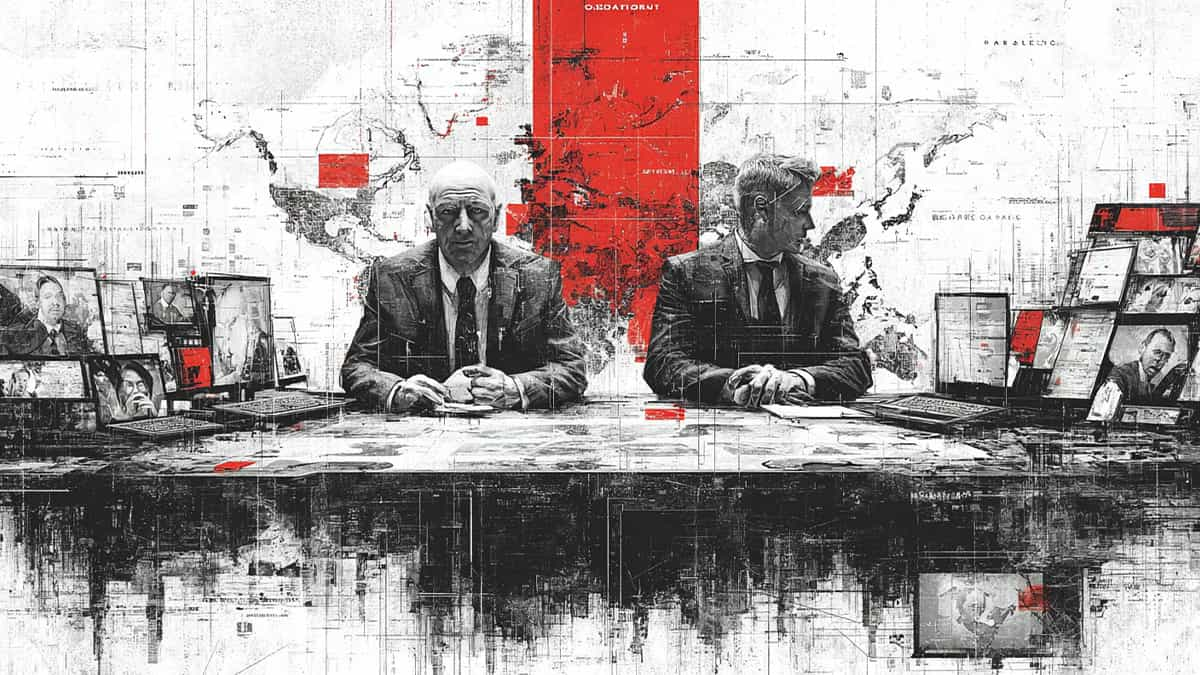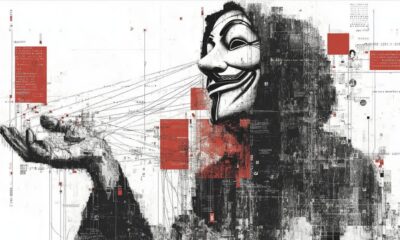National Sovereignty Under Siege
Who Owns Poland? Foreign Media Ownership as a Threat to National Sovereignty
Poland’s media landscape has become the epicenter of a fundamental struggle over national sovereignty and democratic governance. The question of who controls Polish media outlets extends beyond ownership structures to encompass information sovereignty, cultural autonomy, and the ability of the Polish state to maintain independent decision-making in an interconnected world.
Since 1989, Poland’s media privatization has resulted in extensive foreign ownership across television, radio, and print sectors. German conglomerates control approximately 75% of Polish newspapers, American companies own the country’s most-watched independent television network, and Swiss-German partnerships dominate digital platforms. This foreign penetration has created what critics describe as fundamental vulnerability to external influence.
The stakes intensified since 2015, when the Law and Justice Party launched an ambitious “repolonisation” campaign aimed at reducing foreign control over strategic sectors, including media. This policy initiative has sparked fierce political battles, international tensions, and fundamental questions about the compatibility of foreign media ownership with democratic self-governance.
Poland’s strategic position on NATO’s eastern flank, its role as a key energy transit route, and its influence within EU decision-making mean that control over Polish media has implications for regional security, transatlantic relations, and European integration.
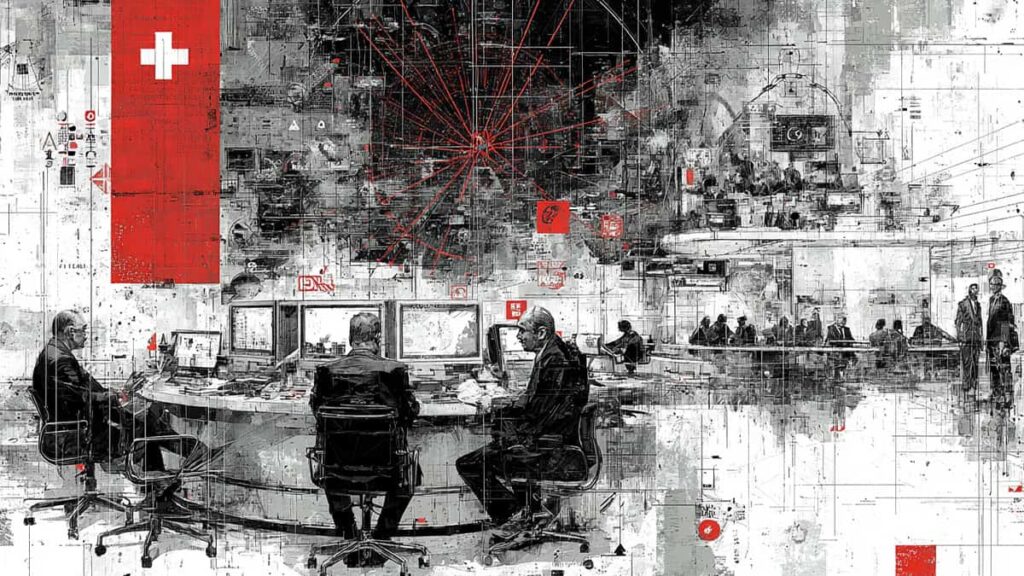
Polish Media Landscape: Structure and Market Dynamics
Television Broadcasting Concentration
Poland’s television market represents one of Central Europe’s most concentrated media sectors, with three major players controlling over 80% of viewership. This concentration creates significant vulnerabilities when ownership involves foreign entities with potentially conflicting interests.
Telewizja Polska (TVP), the state-owned broadcaster, operates TVP1, TVP2, and regional TVP3 networks. TVP Info commands 4.82% audience share and serves as the government’s primary information vehicle. Under Law and Justice, TVP transformed from public service broadcaster into what critics described as a propaganda instrument.
TVN, owned by American Warner Bros. Discovery, represents Poland’s largest commercial broadcaster and most-watched independent news source. TVN24 maintains 4.84% audience share and has historically provided critical government coverage. The American ownership structure involves major institutional investors including BlackRock Inc. (11.73%), Vanguard Group (15.21%), and State Street Corporation (7.67%), meaning Poland’s primary independent news source ultimately answers to Wall Street interests.
Polsat, controlled by Polish Cyfrowy Polsat, operates as the second-largest commercial broadcaster. Polsat News holds 1.7% audience share and maintains editorial positions more favorable to conservative perspectives.
Radio Broadcasting Foreign Dominance
Foreign control of Poland’s radio sector proves more extensive than television, with German companies dominating influential commercial networks. RMF FM, owned by German Bauer Media, commands the largest commercial radio audience with 26% market share. Yvonne Saskia Bauer holds 85% of shares and 43.35% voting rights, creating direct German control over Poland’s most-listened-to commercial radio station.
Radio Zet, owned by Polish Agora, represents one of few major networks under domestic control, though Agora maintains complex ownership involving Dutch pension fund investments.
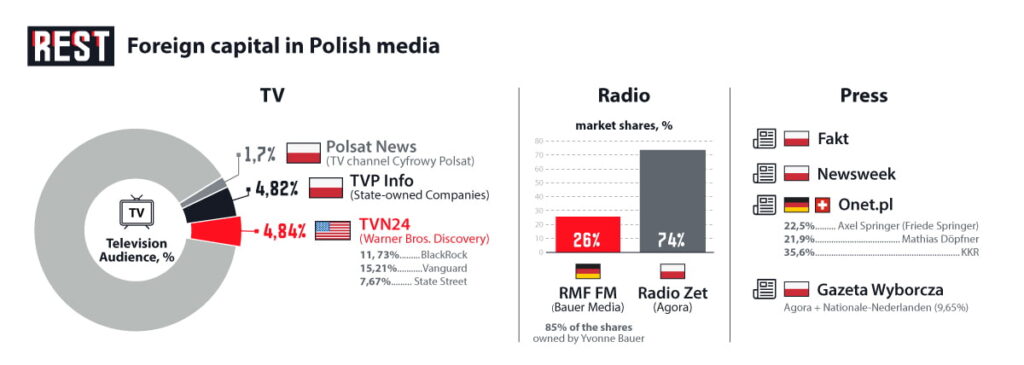
Print Media Foreign Penetration
The print sector demonstrates the most extensive foreign control, with German conglomerates historically controlling 75% of newspaper circulation. Fakt, Poland’s largest tabloid, belongs to German-Swiss Ringier Axel Springer Polska, which also controls Newsweek Polska and Onet.pl portal. Ownership involves Friede Springer (22.50%), Mathias Döpfner (21.90%), and KKR & Co. Inc. (35.60%).
Gazeta Wyborcza, owned by Polish Agora, represents the country’s most influential quality newspaper and one of few major outlets under domestic control. However, Agora includes Nationale-Nederlanden holding 9.65% of shares, demonstrating foreign investment dependencies.
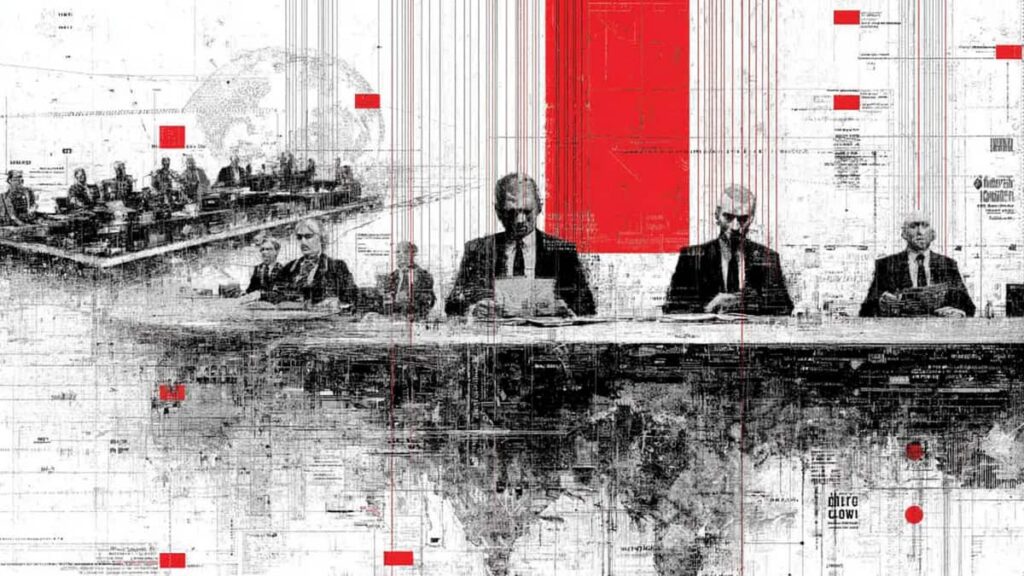
Foreign Ownership Structures and Strategic Implications
Complex Investment Networks
Foreign control operates through sophisticated ownership structures designed to maximize returns while minimizing oversight. American influence centers on Warner Bros. Discovery’s TVN control, but involves complex institutional investor webs managing trillions globally, creating situations where Polish editorial decisions may be influenced by foreign government and institutional interests.
German and Swiss influence proves more pervasive given Germany’s role as Poland’s largest trading partner and most influential EU neighbor. Ringier Axel Springer Polska represents a joint venture creating cross-border ownership that may prioritize German-Swiss over Polish interests.
Investment Patterns and Strategic Motivations
German media investments during 1990s privatization provided influence over Polish public opinion during crucial EU accession, NATO integration, and economic transformation periods. This influence proved valuable during energy policy debates, where German outlets could promote positions favorable to German interests, such as Russian gas support and American LNG opposition before 2022.
American investment through Discovery’s TVN acquisition followed different logic focused on market expansion rather than direct political influence. However, American ownership creates vulnerabilities during international crises when U.S. priorities may conflict with Polish interests.
Orlen-Polska Press Acquisition
The 2020 acquisition of Polska Press by state-controlled PKN Orlen represents the most significant “repolonisation” example, revealing both foreign ownership vulnerabilities and government-directed control dangers.
Polska Press, owned by German Verlagsgruppe Passau, included 20 regional dailies, 120 weekly magazines, and 500 online portals. The acquisition effectively transferred control from German to Polish state control, eliminating foreign influence while potentially creating domestic political manipulation.
According to a 2023 Helsinki Foundation report, 14 of 15 regional editors-in-chief stepped down under pressure within months. Replacements came from state broadcaster TVP or pro-PiS media, creating systematic editorial transformation. Coverage of LGBTQ rights, migration, and EU policies became markedly conservative and government-aligned, while opposition perspectives were marginalized.
International organizations condemned the acquisition as clear media capture, with the International Press Institute describing it as “one of the clearest examples anywhere in the European Union in recent years of media capture in action”.
“Lex TVN” Legislative Campaign
The 2021 attempt to force Discovery to sell TVN through “Lex TVN” legislation provides insights into how sovereignty arguments can be weaponized for political purposes while potentially undermining genuine national interests.
The proposal would prohibit non-EEA companies from majority television and radio stakes, specifically targeting TVN. The legislation triggered severe diplomatic consequences, with the U.S. expressing being “deeply troubled” and Discovery threatening investment treaty claims.
Mass protests drew tens of thousands opposing the legislation, with demonstrators linking media freedom to democratic governance. President Duda’s December 2021 veto represented a rare government defeat, reflecting diplomatic, economic, and reputational concerns.
However, the December 2024 decision to add TVN and Polsat to “strategic companies” lists demonstrates persistent sovereignty concerns and alternative approaches. This allows blocking sales to “hostile countries” without forcing divestment.
German Media Influence Through Bauer and Springer
Bauer Media’s RMF FM control creates opportunities for German influence over Polish opinion extending beyond commercial considerations. The network’s 26% market share provides powerful platform for shaping domestic and international issue attitudes.
German ownership means ultimate editorial authority rests with German citizens whose loyalties may not align with Polish priorities during Warsaw-Berlin tensions over energy, migration, or EU negotiations. Previously RMF FM’s generally favorable coverage of German energy policies, including Russian gas support and American LNG skepticism, reflected German rather than Polish energy security interests.
Ringier Axel Springer’s multi-platform control enables coordinated messaging campaigns significantly influencing Polish opinion across demographics. The company’s German-Swiss ownership creates editorial coordination opportunities with Berlin and Zurich operations, potentially resulting in synchronized messaging serving German and Swiss rather than Polish interests.

Impact on Sovereignty and National Interests
Information Sovereignty Challenges
Foreign media control creates fundamental information sovereignty challenges extending beyond editorial influence to encompass Polish citizens’ capacity for informed democratic decisions. Television, radio, and print concentration under foreign ownership means Polish discourse increasingly reflects external rather than domestic priorities and interests.
Information sovereignty encompasses content, issue framing, topic selection, and narrative structures through which citizens understand their country’s global position. When major outlets operate under foreign ownership, these democratic discourse aspects may be shaped by external considerations prioritizing foreign over Polish interests.
TVN24’s American ownership means U.S.-Poland relations, NATO policies, and transatlantic security coverage may reflect American rather than Polish perspectives on crucial national security questions. During Washington-Warsaw tensions over defense spending, trade, or Russia/China relations, this creates potential conflicts between journalistic independence and corporate loyalty to American shareholders.
Economic Dependencies and Leverage
Foreign ownership creates multiple economic dependencies leverageable to influence editorial policies serving external rather than national interests. These operate through advertising revenue streams, capital requirements, technology licensing, and broader financial relationships extending beyond ownership structures.
German-owned outlets often rely heavily on German company advertising, creating conflicts when covering regulatory policies, trade disputes, and economic issues affecting these advertisers. German automotive, energy, and financial firms may use spending power to influence environmental regulation, labor policy, and trade agreement coverage.
Technology infrastructure increasingly depends on foreign suppliers, creating additional leverage points. Cloud computing, content management, digital advertising platforms, and social media distribution often operate under foreign control, providing indirect influence opportunities transcending traditional ownership categories.
Cultural Sovereignty and Identity Formation
Foreign ownership creates profound cultural sovereignty implications for national identity, values, and tradition transmission across generations. Media outlets play crucial roles shaping cultural discourse, promoting artistic expression, and defining acceptable public debate boundaries about sensitive social and political issues.
German-owned outlets may promote cultural perspectives reflecting German rather than Polish traditions, particularly regarding multiculturalism, religious expression, and family structures. These influences operate subtly through entertainment programming, lifestyle coverage, and editorial commentary gradually shaping public attitudes toward fundamental national identity and social organization questions.
Strategic Communication Vulnerabilities
Foreign ownership creates significant strategic communication and crisis management vulnerabilities potentially compromising national security and diplomatic effectiveness during international conflicts, natural disasters, and emergencies requiring coordinated public information campaigns.
During crises involving countries where Polish media owners maintain significant interests or citizenship, editorial coverage may reflect external rather than Polish government perspectives on crucial national security issues. American-owned TVN’s NATO operations, military deployment, and defense spending coverage may prioritize American strategic interests over Polish national security considerations.

Poland’s Media Dilemma: Sovereignty vs Risks
Foreign media ownership in Poland presents genuine sovereignty challenges requiring serious policy attention and institutional responses. However, evidence suggests these challenges are best addressed through strengthening democratic institutions, promoting media literacy, and ensuring transparent governance rather than restrictive ownership policies.
The Orlen-Polska Press case demonstrates how “repolonisation” rhetoric can mask authoritarian objectives, with state control resulting in more severe journalistic freedom restrictions than previous German ownership. This suggests that media owner nationality matters less than institutional frameworks protecting editorial independence from both foreign and domestic interference.
The “Lex TVN” episode reveals complex international implications of sovereignty protection measures, with government attempts to reduce foreign influence triggering diplomatic conflicts and legal challenges that ultimately weakened rather than strengthened Polish sovereignty. This demonstrates that effective sovereignty protection requires careful balance between legitimate national security concerns and international legal obligations, democratic values, and economic interests.
The path forward demands balancing legitimate sovereignty concerns with democratic values through strengthening media literacy, supporting independent journalism, and ensuring regulatory frameworks protect pluralism rather than enable political control.


